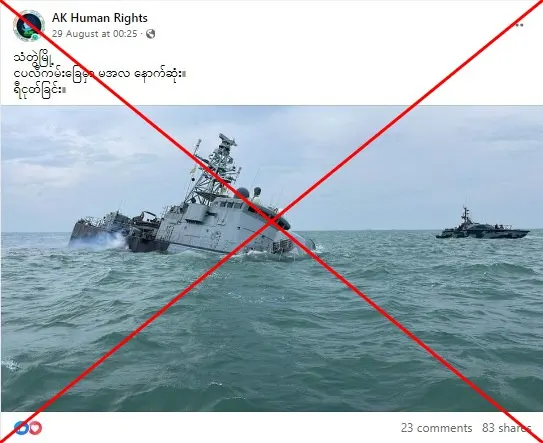In a wave of misinformation, a photo of a Malaysian navy vessel sinking has been falsely circulated online, with claims that it is related to the ongoing conflict in western Myanmar. The image, showing a partially submerged ship, has sparked confusion among netizens and raised concerns about the dangers of sharing unverified information, especially in sensitive geopolitical contexts.

The Photo’s Origin
The image in question, which surfaced on various social media platforms, depicts a Malaysian naval vessel in distress, sinking amid turbulent waters. Initially shared without context, it quickly became attached to misleading narratives suggesting that the vessel was involved in military operations linked to the conflict in Myanmar.
Upon further investigation, it was revealed that the photo was taken during a naval incident unrelated to Myanmar. The vessel, identified as part of the Royal Malaysian Navy, encountered technical difficulties, leading to its partial submersion. The image had nothing to do with any military engagements or conflict zones.
False Connection to Myanmar Conflict
The western region of Myanmar, particularly in Rakhine State, has been a hotbed of tension in recent years, with armed conflicts between Myanmar’s military forces and ethnic armed groups. These ongoing struggles have attracted international attention, and unfortunately, have also become a fertile ground for misinformation.
Some social media users, perhaps driven by a desire to sensationalize, began linking the Malaysian navy vessel incident to the conflict in Myanmar. Without verifying the facts, many assumed the sinking ship was part of a broader military narrative, leading to widespread confusion.
The Dangers of Misinformation in Conflict Zones
Misinformation in conflict zones can have dire consequences. In the case of Myanmar, where tensions are already high, the spread of false information can fuel further unrest, provoke international responses, and complicate peace efforts. Linking unrelated events, like the Malaysian naval incident, to a region in turmoil only serves to muddy the waters and obscure the truth.
In today’s fast-paced digital world, where news spreads in a matter of seconds, the importance of fact-checking cannot be overstated. Governments, organizations, and individuals must take extra care in verifying the content they share online. The recent Malaysian navy photo incident is a prime example of how quickly misinformation can spiral out of control and create false narratives.
Fact-Checking and Responsible Sharing
Several independent fact-checking organizations have since debunked the claim that the photo is linked to Myanmar. These organizations stress the importance of cross-referencing sources before drawing conclusions or sharing content online. The process of verifying news involves consulting multiple, reliable sources, ensuring that the information is not only accurate but also presented in the correct context.
Social media platforms, often at the center of misinformation scandals, have also been called upon to play a more active role in curbing the spread of false information. While platforms like Facebook and Twitter have introduced measures such as flagging misleading content, the responsibility also falls on users to be vigilant and responsible when sharing news.
The Role of Governments and Media in Combating Misinformation
Governments and media outlets play a critical role in combating misinformation, especially in conflict zones. Official channels should prioritize transparency and rapid dissemination of factual information to counter false narratives. In the case of the Malaysian navy vessel, both the Malaysian and Myanmar governments could have quickly clarified the situation to prevent further speculation.
Journalists and media professionals must also adhere to the highest ethical standards, ensuring that they report accurately and avoid sensationalism. This includes verifying the authenticity of images and videos before publication.
Lessons Learned: Verify Before Sharing
This incident serves as a stark reminder of the importance of responsible news consumption and sharing. As global citizens, it’s essential to be mindful of the content we interact with online, especially when it pertains to sensitive issues such as military conflicts. By taking a moment to verify information and check sources, we can help reduce the spread of misinformation and ensure that the public receives accurate news.
The Malaysian navy vessel’s unfortunate incident, while significant, had no relation to the conflict in Myanmar. Yet, due to the rapid and unchecked sharing of content, a false narrative was born, demonstrating how quickly misinformation can gain traction.
As social media continues to play an increasingly central role in the dissemination of news, both individuals and platforms must collaborate in fostering a culture of truth and transparency. Combatting the spread of false information requires vigilance, fact-checking, and a commitment to sharing only verified content.
In conclusion, while the photo of the Malaysian navy vessel sinking captured a real event, its misrepresentation as part of the Myanmar conflict highlights the ongoing challenge of misinformation. As we navigate the digital age, let us all strive to be more discerning in the information we consume and share.
For more insights and accurate news updates, visit Digital Digest.




